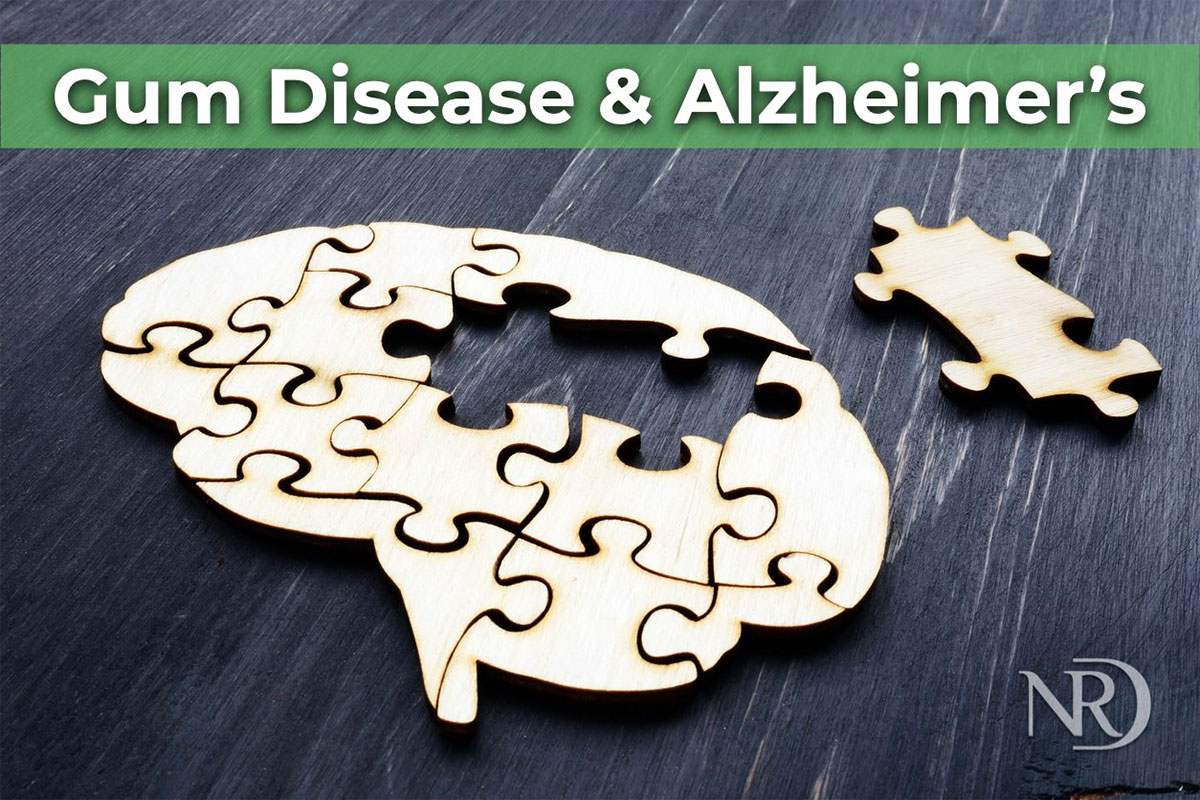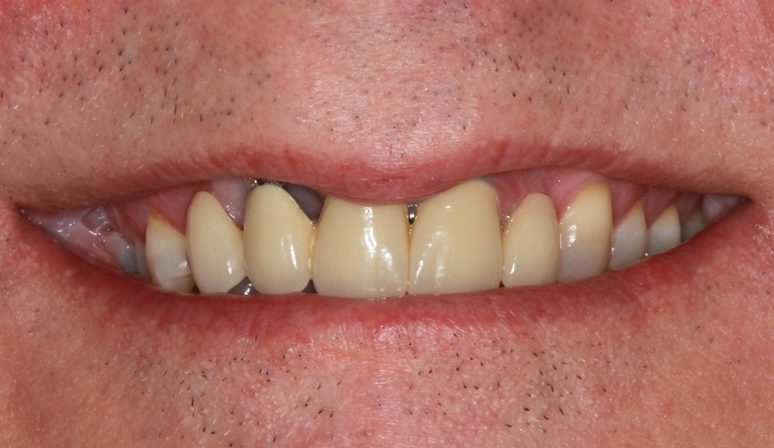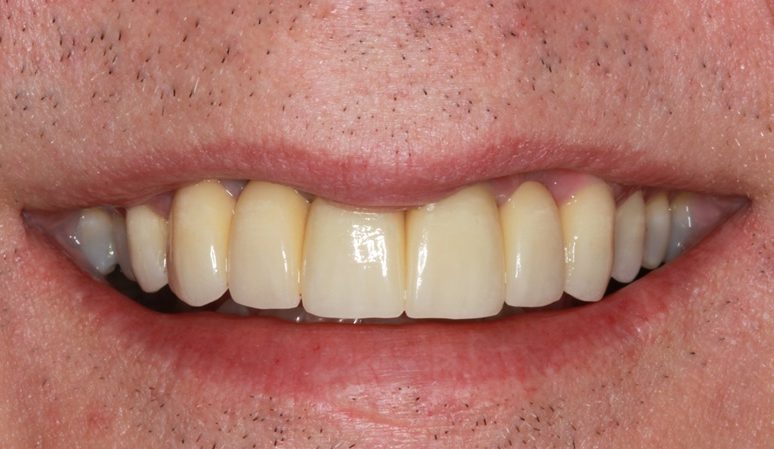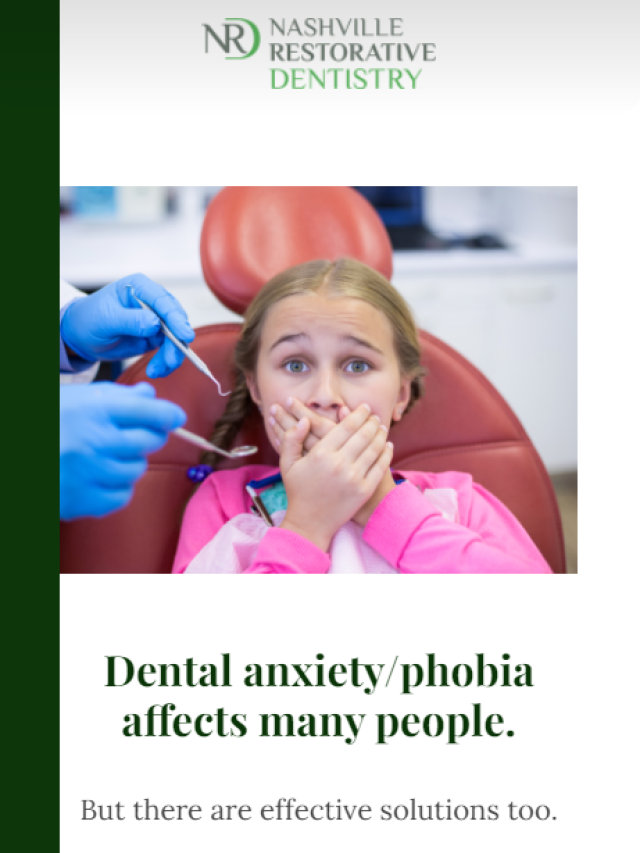
01
Jul
New Study: Link Between Gum Disease and Alzheimer’s

According to recent research by New York University’s College of Dentistry and Weill Cornell Medicine, gum disease could lead to an increase in the likelihood of developing Alzheimer’s disease.1
What causes Alzheimer’s disease?
While doctors are still learning more about Alzheimer’s and its causes every day, they have identified two key warning signs that show the disease could be developing in a patient. The first is when microscopic compounds called amyloid-beta proteins start clumping together to form a kind of plaque in the spinal fluid. These clumps can start to interfere with the billions of messages2 your brain is sending every second.
The second issue occurs when a second compound called tau proteins starts to build up in the brain’s neurons and form tangles. Again, this interferes with the brain’s ability to communicate. Each of these problems leads to brain cell death and, ultimately, a loss of cognitive ability.
How is gum disease a factor?
Gum disease is caused by an imbalance of oral bacteria. Your mouth is home to both “good” bacteria that protect your mouth and keep it healthy, as well as “bad” bacteria that cause inflammation. When the gums become infected, it can cause pockets of bone loss to form between the gums and teeth, which then can become infected with even more bacteria. Gum disease has already been linked to a number of other serious health concerns; including cardiovascular disease, heart attack, stroke, diabetes, and even cancer.
Researchers from NYU and Weill Cornell say the evidence is growing that an imbalance of oral bacteria and resulting inflammation correlates with an increase in those two biomarkers mentioned above. They conducted a study in which 48 healthy seniors with no signs of dementia gave an oral swab and a CSF (spinal fluid) sample to be studied.
The test revealed that patients with more harmful bacteria are more likely to have reduced levels of CSF amyloid-beta; a warning sign that the Alzheimer’s-related protein is gathering in the brain.
The team believes the inflammation itself is the source of the problem, which means that the good oral bacteria that fight inflammation play as big a role as the bad bacteria that cause it.
What Causes Gum Disease and How it's Treated

The two main components that we’re looking at when we’re evaluating what’s going on in your mouth that can negatively affect your overall health is gum disease and infected teeth. So Gum disease can have two different components: Gingivitis and Periodontitis. Gingivitis is reversible inflammation of your gum tissue that is caused by the bacteria and plaque. It creates inflammation which leads to bleeding, but it’s reversible which means we can make it go away and there’s no long term damage that’s taken place. Periodontal disease is where you’ve actually lost bone. That infection has progressed. It’s been more longstanding or more aggressive in its destruction. So when we look at X-rays of the teeth we see that bone levels have receded. So you’ve lost anchoring support that keeps your teeth stable.While that in and of itself is a concern, the bigger issue is that inflammation caused by the bacteria that creates the disease is entering your bloodstream. So whether it is gum disease, whether it is infected teeth that are actually abscessed, bacteria is at the root of all of that. The bacteria is getting into your circulatory system. So when you see all the headlines about how gum disease is connected to cardiovascular disease, heart attack risk, stroke risk, type 2 diabetes, certain types of cancer, Alzheimer’s disease, all the litany of research that is coming out right now is connected to how that infection is creating chronic inflammation and inflammation is the key to all of this. So treating gum disease is really about ridding our bodies of inflammation just as much as it is about making our mouths themselves healthier.
The ways to treat gum disease depend on which type of gum disease you actually have. Gingivitis is a reversible inflammation of the tissue that is really just based on plaque staying along the gum line. So, regardless of whether you’re using certain types of toothpastes or rinse, it really comes down to removing that biofilm consistently. As that plaque goes away, the tissue is going to heal, the inflammation is going to go away, the bleeding is going to stop and there won’t be a continued destructive nature to the disease. Gum disease that has transitioned into Periodontitis where we’ve seen bone destruction and attachment loss from the tissue, that treatment is going to be more involved. And there is different levels of severity of it, but more or less your treatment is going to consist of having in-office work done as well as what you’re doing at home. So in the office we’re using ultrasonics, lasers, ozonated water, different ways to disrupt the buildup of bacteria and biofilm below the guideline. At home, you’re going to be using electric toothbrushes, water picks, flossing, certain types of rinse or gel products that are usually going to contain an essential oil or be peroxide-based to be disrupting the bacteria while you’re in between visits. But the connection between your in-office and at-home recur program are going to be important because you can’t keep periodontal disease from being destructive just by going to the dentist. You can’t just do it at home. There’s got to be a teamwork focus between you and your dental care provider to keep that inflammatory process in remission so you’re not continuing to experience destruction of bone levels, bleeding of gum tissue or the inflammation that results from it.
Want to fight Alzheimer’s Brush and floss?
Periodontal disease (or gum disease) is a completely preventable condition. And preventing it is as easy as brushing twice a day and flossing. These two hygiene routines are extremely effective at ridding your mouth of debris and the bad bacteria that cause gum inflammation.
Don’t like flossing? Try a Waterpik instead — studies show it’s actually more successful at removing the bacteria containing plaque in between your teeth. For added protection, a good mouth rinse can help clean some of the more difficult-to-reach spots in your mouth. We really like the Brushing Rinse products which are organic and use peroxide and essential oils to combat those bad bacteria. The use of an oral probiotic is something that is also showing promising results in helping balance the oral bacteria.
It is equally as important to have regular preventive care visits with your dentist. Dental hygienists are trained experts with specialized ultrasonic instruments that are much more effective at removing tartar buildup and those bad bacteria from your teeth and gums than you can accomplish alone. Other steps you can take to improve your gum health are to avoid smoking, get plenty of vitamins A & C, and have your dentist correct any issues such as faulty fillings or crowded teeth.
Actual Patients Results


Neal

Issue: An old existing bridge was no longer esthetically acceptable to him. The midline of the two front teeth looked tilted and the space between the replacement teeth and the gums created a visible darkness in his smile.
Solution: The old bridge was removed and a new all ceramic bridge was made to straighten the midline, fill in the dark spaces, and create more natural appearing gum contours. The upper right canine and lateral incisor as well as the upper left lateral incisor are replaced by this bridge.
We are equipped to handle the majority of your dental needs.
We understand the importance of having a dentist you can trust. And that means not being sent off to a different specialist every time you need a new procedure. At Nashville Restorative Dentistry, we are equipped to handle the majority of your dental needs, from cosmetic to restorative, implants to extractions. When you come to us, you are getting a dental team for life.
Sources
1Melore, Chris (2021, April 13). “Imbalance in Gum Bacteria Linked to Alzheimer’s Disease Biomarker.” Study Finds (NYU). https://www.studyfinds.org/gum-disease-alzheimers-disease/
2Khan Academy. “Signal propagation: The movement of signals between neurons.” https://www.khanacademy.org/test-prep/mcat/organ-systems/neural-synapses/a/signal-propagation-the-movement-of-signals-between-neurons
Share this Article
Experience excellence in dental care today.
You shouldn’t have to worry about your mouth or let unpleasant past dental experiences prevent you from living the life you want.
Reviewr Name
Michelle W.
Patient Testimonial
Issue: Spacing between the front teeth and an uneven tilt to the smile.
Solution: Short term orthodontics to evenly spread out the space between the teeth followed by veneers across the eight front teeth to create a level smile with color consistency and no spaces.







